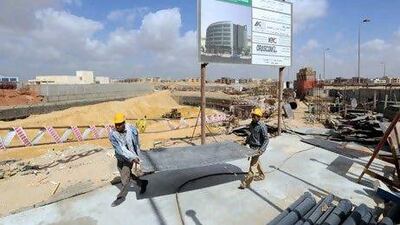Egypt will require the help of Arab and European nations to recover from the economic impact of its revolution, and a US$10 billion (Dh36.73bn) "Marshall Plan" may already be under discussion, the country's richest man said yesterday.
Nassef Sawiris, the chief executive of Egypt's largest publicly traded company and the youngest son of the Sawiris family, said he expected a donors' conference to consider support for Egypt and Tunisia including debt forgiveness, investments and infrastructure-for-debt swaps.
"A Marshall Plan is in the works," Mr Sawiris said, referring to the support given to Europe by the US after the Second World War. "I have no doubt that something will be on the table before the summer."
Such a plan would serve the interests of southern European states because a growing North African economy would stem the number of migrants crossing illegally from North Africa to Europe, he said.
Forbes magazine ranks Mr Sawiris, the head of Orascom Construction Industries, with an estimated personal net worth of $5.6bn, as the world's 182nd richest person and the wealthiest in Egypt.
The country's economy has already felt the impact of the uprising that ousted Hosni Mubarak from the presidency last month. Thousands of factories closed temporarily and the stock market was inactive for seven weeks.
The Egyptian Exchange reopened last Wednesday, and the benchmark index fell 8.9 per cent that day to 5,142.71, its lowest point in two years. However, the sell-off subsided and the index closed up 5.2 per cent yesterday at 5,212.08.
Orascom Construction's shares have fallen by 22.8 per cent since the beginning of the year. The company posted a profit of $186 million for the fourth quarter of last year, an increase of 76.1 per cent compared with the same period in 2009.
Mr Sawiris said that for a week during the unrest, the company halted the production of fertiliser, its fastest-growing business line.
But Orascom Construction's exposure is not limited to the Egyptian economy. It has infrastructure and construction projects across the Mena region, and about 70 per cent of its construction revenue comes from outside the country, financial statements show.
With major property companies now facing investigations and allegations of corruption, property development in Egypt is at a standstill.
A judicial panel is expected to rule on April 26 whether a sale of government-owned land to Palm Hills Developments, Egypt's largest publicly listed developer, should be overturned.
The allegations are that the land was priced too cheaply and was not publicly auctioned. The company's chairman, Yasseen Mansour, is facing criminal charges.
The government has signalled it might not pursue criminal charges in some land cases if the buyers agree to settle with the government. Mr Sawiris said such an approach would avert a "lose-lose situation".
"A lengthy status quo will obviously create additional problems in terms of employment, in terms of people who bought units from these developers, and in terms of banks that have lent money to these developers," he said. "It's in everybody's favour that this problem is wrapped up."
The next nine months will be a crucial period for the future of the country, with a presidential election and the formation of new political parties. Contrary to speculation that the new political discourse will push the country to the left, Mr Sawiris said he saw it moving "three nudges to the right".
"I think the acceleration of privatisation as a type of reform will be an outcome in 2012," he said.
"Relaxing the policy of protecting the Egyptian pound is already happening. That will encourage exports and foreign direct investment."
Mr Sawiris cited the new Egyptian finance minister, Samir Radwan, telling fund managers at the London Stock Exchange on Friday that the "biggest challenge now is economic". "He said all the things that investors want to hear: commitment to the private sector, reform, free markets," Mr Sawiris said. "He also identified that there are a lot of governments regionally and globally who have made very strong commitments to support the Egyptian economy."
He did not expect the Egyptian government's controversial subsidies programme to be changed soon but said it should eventually be reformed so the country's poorest benefited the most.
Mr Sawiris cited Turkey and Malaysia as good Islamic models for the reforms taking place in Egypt.
"You want to develop an economy that is similar to the Turkish economy, rather than the economy in Iran," he said. "If you have to choose a model … you'll follow a country that with much less resources than Egypt is doing extremely well."

